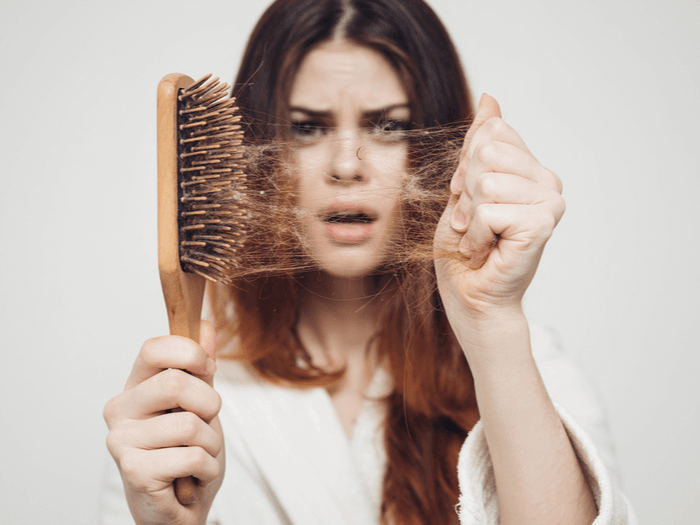我们为什么会脱发?
Is Iron Deficiency Causing Your Hair Loss?

By Monica Reinagel
Is your hair falling out? Nutrient deficiencies may be to blame. Reversing it starts with finding the cause.
A small amount of hair collecting in the shower drain or hairbrush is not necessarily cause for concern. According to the Academy of Dermatology, it's perfectly normal to lose 100 or so hairs from your head every day.
Gradually thinning hair as you age is also normal, and largely hereditary. But hair loss—especially when it's sudden or at a young age—can also be a sign of certain medical conditions or nutrient deficiencies.
In these cases, identifying and correcting the problem can often reverse your hair loss. But the sudden onset of thinning hair is not the time for self-diagnosis or treatment. Guessing wrong and treating a problem that doesn't exist not only won't help; it may actually make the problem worse!
What causes thinning hair?
Two of the most common non-hereditary causes of hair loss are low thyroid function and iron deficiency. Both are relatively common, especially in women. And although they are two completely different conditions, they share some of the same symptoms. In addition to hair loss, fatigue and cold hands and feet can be signs of both low thyroid and iron deficiency. These conditions are readily diagnosed with a simple blood test. They can be easily corrected, either with replacement thyroid hormones or iron supplements.
Two of the most common non-hereditary causes of hair loss are low thyroid function and iron deficiency.
If you suspect you might be low in iron, ask your doctor to confirm your suspicions before taking any iron supplements. Taking an over-the-counter iron supplement if you don't have an iron deficiency is potentially harmful.
If it turns out you're not low in iron, it's time to connect with your doctor and keep looking for other possible explanations for your symptoms.
If you are iron deficient, your doctor will likely want to recheck your levels after a few weeks of supplementation. If the iron supplements don't seem to be helping, work with your doctor to explore and rule out less common causes of iron deficiency.
How much iron do I need?
Although it's not a good idea to take iron supplements unless you know you need them, it is a good idea to make sure your diet contains enough iron to meet your needs. Here are the recommended daily allowances for various groups:
Adolescent girls: 15 mg per day
Adolescent boys: 11 mg per day
Adult men and post-menopausal women: 8 mg per day
Menstruating women: 18 mg per day
Pregnant women: 27 mg per day
The three groups that are most likely to fall short are adolescent girls and premenopausal or pregnant women.
What to eat to get more iron
All meat, poultry, and seafood provide the more absorbable heme form of iron. Beef, chicken livers, clams, and oysters are particularly good sources.
Although there's plenty of iron to be found in plants—especially dried beans and lentils, spinach, quinoa, and pumpkin seeds—the nonheme iron in plants isn't as well absorbed. Strict vegans are advised to get 50% more iron than the recommended daily allowance (RDA) to compensate for the lower absorption from plant foods. Eating foods high in vitamin C can help you absorb more iron from plant sources.
Vegans are not actually any more likely to suffer from iron deficiency than meat-eaters.
Vegans are not actually any more likely to suffer from iron deficiency than meat-eaters. But if you are a strict vegan, you may wish to avoid drinking black tea with your meals. Tea contains tannins that also interfere with the absorption of iron from plant foods. (Herbal tea is not a problem.)
High doses of calcium, especially calcium carbonate, the form found in most supplements, can also block the absorption of iron. You don't need to worry about food sources of iron and calcium. But if you're at risk of iron deficiency and you take a calcium supplement, take the calcium before bed to minimize the interference with iron from your meals. If you're also taking an iron supplement, take it at a different time of day.
Anemia is not always iron deficiency
Iron deficiency can cause anemia. But anemia is not always due to iron deficiency. Low folate or B12 levels can also result in anemia. And just to make the whole thing a little more complicated, taking folate acid or B12 supplements can make it harder to detect an iron deficiency.
Taking nutrients when you don't need them is not just a waste of money; it can actually cause problems.
Taking vitamin supplements may seem like a harmless way to bolster your health. But taking nutrients when you don't need them is not just a waste of money; it can actually cause problems. They include adverse reactions and interactions, liver and kidney toxicity, and the delay of proper diagnosis and treatment.
Aside from documented nutrient deficiencies and specific therapeutic applications, supplements are really not the best way to deliver nutrients to your body. For that, you just can't beat a balanced diet of nutrient-dense foods. And good food is also a cheaper and far more enjoyable way to get your nutrients than a belly full of pills.
The bottom line on hair loss and iron
A good diet, including iron-rich foods, can help keep both you and your hair nice and healthy. And excessive hair loss can signal a nutrient deficiency or other conditions. But if you feel like you are losing too much hair, check with your doctor before self-diagnosing or treating yourself with any vitamin supplements, especially iron.